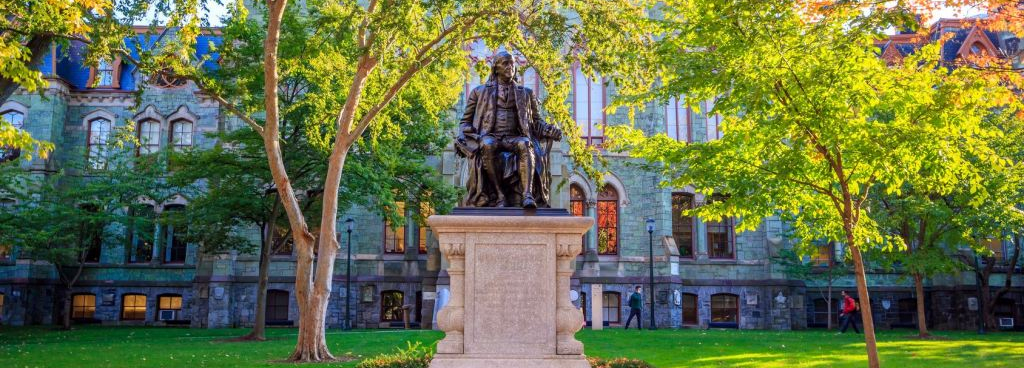As a member of the Ivy League that’s known for its rural setting and renowned Greek life, Dartmouth College ranks at the top of many students’ lists of best-fit colleges. The school has plenty of well-regarded programs and is the only member of the Ivy League that is an undergraduate-focused college, rather than a university.
Since Dartmouth College has a stellar reputation and receives thousands of applications each year, students must go the extra mile to stand out. Learn what sets Dartmouth College apart and how applicants can increase their chances of admission.
How to Get into Dartmouth College: Table of Contents
- When to Apply to Dartmouth College
- How Hard Is It to Get into Dartmouth: Early Prep
- How Do You Actually Get into Dartmouth: The Application
- Class Profile
- What Makes Dartmouth College Unique?
- Dartmouth College FAQs
When to Apply to Dartmouth College
When it comes to applying to Dartmouth College, one of the first steps students must take is reviewing the application timeline and making sure they’re prepared to meet every admissions milestone. Like most top-tier colleges in the United States, Dartmouth uses a holistic admissions process that requires students to complete various steps and submit different materials on specific timelines. Here is an overview of the Dartmouth College admissions process and the dates that prospective applicants need to keep in mind.
Dartmouth Application Deadlines
Dartmouth’s application deadlines vary slightly from year to year, but generally occur around the same time in the academic calendar. For students applying during the 2024-25 admissions cycle, the major application deadlines are as follows:
- November 1: Early Decision applications
- November 1: Early Decision financial aid applications
- January 2: Regular Decision applications
- February 1: Regular Decision financial aid applications
Students who apply to Dartmouth College Early Decision will learn of their results in mid-December and, if admitted, must reply with their intent to enroll by late December. Applicants who opt for the Regular Decision round will hear back from Dartmouth by early April and, if admitted, must respond to accept or decline by May 1.
Early, Rolling, and Regular Decision
As students enter high school, they may start hearing about different application processes, such as Early Action vs rolling admission. While much of the application process will look similar regardless of your timeline, it’s important to understand the distinct differences between early, rolling, and Regular Decision admissions.
There are two different forms of early admissions: Early Action and Early Decision. The key difference between the two is that Early Decision is binding, meaning a student must enroll in the college if they are accepted, while Early Action is not binding. Most Early Decision and Early Action deadlines occur around the beginning of November, with decisions released about one month after. Dartmouth only offers Early Decision and does not offer Early Action.
Regular Decision is the most common admissions option. It’s a non-binding application option that typically has a deadline in early January. Dartmouth College offers Regular Decision.
In contrast, rolling admissions do not follow a strict deadline. At most schools that offer this option, applications are accepted from September until May — although it is best to submit your application as early as possible, since RA schools will continue to accept students until they reach their enrollment capacity. Dartmouth College does not offer rolling admissions.
Waitlisted Applications
After the Early Decision round, there are only so many spaces left for students applying in the Regular Decision round. That is why students applying RD may be accepted, denied, or waitlisted. If you are waitlisted at Dartmouth, it means you are a good fit for the college but there is not enough room in the class. You can choose to accept or decline your spot on the waitlist — however, waitlist admission rates tend to be very low at highly selective schools like Dartmouth.
Deferrals
Students who apply via Early Decision may be accepted, denied, or deferred. A deferral means students will need to wait until Regular Decision notifications are released to learn if they will be admitted or not. Many students want to know what to do if they have been deferred. According to Dartmouth admissions, “Early Decision deferred applicants should submit a brief update regarding recent notable academic, extracurricular, and/or personal accomplishments; some applicants may wish to submit other material, such as new standardized exam scores and/or an additional letter of recommendation.” Check with the admissions office to find out what materials they need from you.
How Hard Is It to Get into Dartmouth: Early Prep
Dartmouth College is one of the most prestigious institutions in the country. Every year, only a small percentage of students are admitted out of the thousands who apply, as these admission rates demonstrate:
- Class of 2026: 6.38%
- Class of 2027: 6.23%
- Class of 2028: 5.40%
- Class of 2029: 6.03%
While Dartmouth’s application process is notoriously competitive, students can increase their chances of admission by preparing well in advance and doing their research to become experts on the school.
Build Your Profile
Students must understand what the college is looking for so they know how they can stand out from the crowd. In Dartmouth College’s admissions process, academics are the factor that carries the most weight in college admissions decisions. Dartmouth’s admissions officers seek students who are intellectually curious and demonstrate an ongoing commitment to challenging themselves.
So, what does Dartmouth look for in addition to academics? Dartmouth evaluates students holistically, looking to admit a class of students who will make a lasting impact on the community. Students who choose to attend Dartmouth College will not only gain a top-tier education; they will also develop a sense of responsibility for one another and for the outside world and will be presented with ample opportunities to share their expertise and passions.
Throughout their application process, students should highlight what they are passionate about, what they’ve done to pursue these passions throughout high school, and how attending Dartmouth College will help them take these pursuits to the next level. Students can discuss both academic interests and extracurricular activities that are meaningful to them.
Visit the Campus
If you’re eager to attend Dartmouth College, a campus visit is the best way to understand how well you will fit in. Dartmouth offers several on-campus information sessions and tours throughout the year. Can’t make it to campus? You can also register for a live virtual information session and tour or view a pre-recorded tour.
Connect with a Student
In addition to touring the campus, it can be helpful to get a student’s perspective on their experience at Dartmouth College. If you are on a tour, feel free to ask your student tour guide any questions you may have. Additionally, you can connect with a student through Dartmouth’s website, which will allow you to email them with questions.
How Do You Actually Get into Dartmouth: The Application
While there is no way to guarantee your admission to Dartmouth College, you can craft a long-term strategy that will increase your odds and set yourself apart from other applicants. Looking at a recent class profile can give you a better understanding of what Dartmouth is looking for.
GPA Requirements
Dartmouth College doesn’t have a required GPA for admission and does not report the high school GPA of enrolled students. However, of the students from the class of 2028 who submitted their class rank, 93% graduated in the top 10% of their class. Since academic excellence is one of the primary considerations for admission, it’s important to have the highest GPA possible in the most rigorous courses available to you.
SAT and ACT Scores
After being test-optional for several admission cycles following the pandemic, Dartmouth College now requires standardized test scores. Dartmouth last reported the scores for the class of 2024. The middle 50% of students from that class scored 32-35 on the ACT and 1440-1560 on the SAT.
Personal Statement
Your personal statement is a chance to tell your unique story. Students have seven Common App essay prompts to choose from, so select the one that best represents the story you want to tell about yourself. While your personal statement should demonstrate strong writing skills, it’s also important to be authentically you.
Essays
In addition to your personal statement, you will need to write several Dartmouth supplemental essays. The school requires responses to three short answer questions. To help you plan your Dartmouth essay strategy, here are the questions for the 2024-25 admissions cycle:
Required of all applicants. Please respond in 100 words or fewer:
As you seek admission to Dartmouth’s Class of 2029, what aspects of the college’s academic program, community, and/or campus environment attract your interest? How is Dartmouth a good fit for you?
Required of all applicants, please respond to one of the following prompts in 250 words or fewer:
A. There is a Quaker saying: Let your life speak. Describe the environment in which you were raised and the impact it has had on the person you are today.
B. “Be yourself,” Oscar Wilde advised. “Everyone else is taken.” Introduce yourself.
Required of all applicants, please respond to one of the following prompts in 250 words or fewer:
A. What excites you?
B. Labor leader and civil rights activist Dolores Huerta recommended a life of purpose. “We must use our lives to make the world a better place to live, not just to acquire things,” she said. “That is what we are put on the earth for.” In what ways do you hope to make—or are you already making—an impact? Why? How?
C. In “Oh, The Places You’ll Go,” Dr. Seuss invites us to “Think and wonder. Wonder and think.” Imagine your anticipated academic major: How does that course of study sync with Dr. Seuss’s advice to you?
D. The social and family interactions of wild chimpanzees have been the focus of Dame Jane Goodall’s research for decades. Her understanding of animal behavior prompted the English primatologist to see a lesson for human communities as well: “Change happens by listening and then starting a dialogue with the people who are doing something you don’t believe is right.” Channel Dame Goodall: Tell us about a moment when you engaged in a difficult conversation or encountered someone with an opinion or perspective that was different from your own. How did you find common ground?
E. Celebrate your nerdy side.
F. “It’s not easy being green…” was the frequent refrain of Kermit the Frog. How has difference been a part of your life, and how have you embraced it as part of your identity, outlook, or sense of purpose?
G. Buddy Teevens ’79 was a legendary and much-beloved coach at Dartmouth. He often told parents: “Your son will be a great football player when it’s football time, a great student when it’s academic time, and a great person all of the time.” If Coach Teevens had said that to you, what would it mean to be “a great person”?
Letters of Recommendation
Dartmouth College requests two letters of recommendation from teachers and an evaluation from a high school guidance counselor, in addition to strongly encouraging a fourth letter of recommendation from a peer. It’s important to ask teachers who know you well and can write about your character as well as your academic performance and engagement in the classroom. Since teachers may receive multiple requests to write recommendation letters, it’s advisable to ask as early as possible.
Admission Interviews
Students may be invited to an optional interview conducted by volunteer alumni admissions ambassadors. These interviews take place after students submit their applications and are dependent on availability and geography. If a student is not offered an interview, they are not at any disadvantage in the admissions process. The Dartmouth interview is both informative and evaluative and may take place via virtual platform or phone call.
Contribution to the Dartmouth Community
Like many colleges, Dartmouth is eager to admit students who will make an impact on campus and beyond. It’s important to use every component of your application process to highlight your goals and how you plan to contribute to the Dartmouth community. Be as specific as possible, naming clubs, classes, and research opportunities of interest. A commitment to giving back and connecting with the community is particularly crucial at a small, tight-knit college like Dartmouth, as every student will have a tangible impact and shape the campus experience.
Class Profile
Reviewing Dartmouth’s class profile gives you a window into admissions outcomes. You might find information like the most recent acceptance rate, class size, and the demographics of enrolled students. This information can help you better understand the college and assess your chance of admission. For example, here is the profile for the class of 2028.
What Makes Dartmouth College Unique?
There are plenty of factors that make Dartmouth College unique. Most notably, it’s the only Ivy League institution that is a college, rather than a university. This is a conscious decision that reflects Dartmouth’s undergraduate focus and the tight-knit culture that students will experience once they step foot on campus. Dartmouth has an array of renowned academic offerings, including visual and performing arts programs, STEM majors, and social sciences.
In addition to top-tier academic classes, students have no shortage of extracurricular options. The college’s Outdoor Programs Office is dedicated to creating opportunities for members of the Dartmouth community to explore and enjoy the amazing natural landscape of New England. Dartmouth even has its own ski area — the Dartmouth Skiway. If students are interested in participating in Greek life, they will have the opportunity to join one of the 28 Greek chapters that are active on campus.
Students enjoy many traditions, such as the Dartmouth Powwow and Winter Carnival. Famous alumni include Robert Frost, Dr. Seuss, Mindy Kaling, Fred Rogers, Kirsten Gillibrand, Meryl Streep, Shonda Rhimes, and Elaine Chao.
Dartmouth College FAQs
What is Dartmouth’s acceptance rate?
Dartmouth’s acceptance rate is currently around 6%.
Where is Dartmouth College located?
Dartmouth’s campus is in rural Hanover, New Hampshire — roughly two hours from Boston.
What majors is Dartmouth known for?
Dartmouth is known for its majors in economics, computer science, government, biology, and engineering.
What GPA do you need to get into Dartmouth?
Dartmouth does not require a specific GPA to get in, nor does it report the high school GPA of its enrolled students. Because it’s highly competitive, it’s important to earn the highest grades possible in the most challenging courses available to you.
Admission Counseling
College admissions is more competitive than ever, which is why students and families can benefit from college admissions counseling. An accredited, qualified college admissions counselor can demystify the admissions process and guide students every step of the way. They know what admissions committees are looking for and can help students submit the strongest, most compelling applications to increase their chance of admission.
IvyWise college admissions counselors have helped numerous students gain admission to Dartmouth and other highly selective schools. Learn how we can help you achieve your academic goals by scheduling an Initial Consultation.
Get Started




